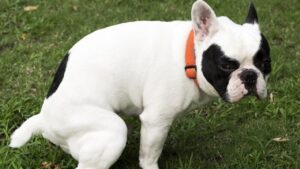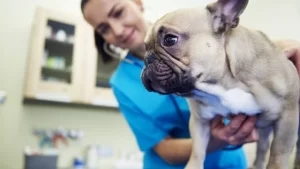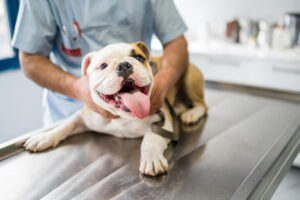
The last thing any dog owner will like to see when cleaning up after their furry friend is poop encased in a membrane. Healthy dog poop has a firm texture, slightly moist but easy to pick up.
However, there could be trouble in paradise if your dog’s turd is covered in a jelly-like substance. Fortunately, a dog’s fecal matter offers essential information that can determine if the dog is healthy or sick.
Before you scroll down to a more in-depth answer to this guide, “Dog Poop Encased in Membrane – What Does This Mean,” you can check out these articles: Why Is My Dog’s Poop Grainy? and Dog Food For Less Poop.
What Causes Mucus in Dog Poop?

Firstly, don’t be alarmed to see a bit of mucus in your dog’s poop. The presence of this slimy, filmy material is normal. The intestinal tract glands secrete mucus to lubricate the colon, keeping it moist enough for stool to pass through.
Nonetheless, significant amounts of membrane alongside vomiting, blood stool, and diarrhea may indicate a problem. Below are some of the causes of mucus in dog poop.
Irritable Bowel Syndrome
Irritable bowel syndrome isn’t a disease but a condition that occurs when the intestinal tract suffers chronic irritation. Dogs that have IBS may suffer poor appetite, diarrhea, and vomiting. Alongside membrane-encased poop, other symptoms and signs OF IBD include:
- Weight loss
- Fatigue
- Chronic vomiting
- Depression
- Gas
- Abdominal rumble
- Blood in stool
- Hair loss
- Depression
IBS shouldn’t be mistaken for IBD. The latter is a disease, while the former indicates an underlying health condition.
Bacterial Infection
Sometimes, the membrane isn’t whitish. You can usually attribute the green membrane in dog poop to food coloring. Still, greenish mucus sometimes indicates a bacterial infection.
Stress

It may seem unlikely, but dogs go through stress. Their mental health has a significant impact on the way they poop.
Dogs with anxiety may have diarrhea which may consist of watery poop encased in membrane and blood.
This factor is even likelier when the dog has the urge to go all the time, including straining when taking a dump. The best way to tackle the issue is to attack the root cause of the problem – stress.
Dietary Indiscretion
Suppose your dog is a notorious counter surfer or dumpster diver. In that case, there’s a likelihood of eating something reacting to his stomach.
You can remedy the mucus situation by giving your dog slippery elm bark. If that’s unavailable, provide a bland diet for a few days to fix the problem.
Food Intolerance
Allergies are a problem for dogs just as well as humans. Food intolerance often causes a chain reaction from an upset tummy leading to flatulence, diarrhea, or vomiting.
Excessive mucus in poop is also another possibility worth considering. Common food intolerances include undercooked eggs, raw bones and uncooked meat, greasy foods, and dairy produce.
Dietary Changes
A recent dietary change may be the culprit if you recently introduced a new dog food brand. Sometimes, liquid fecal matter or dog poop encased in a membrane signifies that your furry friend’s digestive tract is coming to terms with the new food.
The solution is to introduce this new diet in minute amounts, mixing it up with the old food. You can continue providing your dog with the new food if there’s no sign of constipation or diarrhea.
Your furry family member should adjust within two weeks, with the poop returning to normal. Speak to a veterinarian if that isn’t the case.
Inflammatory Bowel Disease

Inflammatory Bowel Disease is a condition where inflammatory cells attack the intestinal tract. Plasmacytes and lymphocyte infiltration are the two common types of IBD.
Shar Pei and German Shepherds are two dogs prone to this condition. Mucus in the stool may indicate IBD, and your best bet is to visit the vet as soon as possible.
Crohn’s Disease
Crohn’s disease is an aggressive type of IBD. Loose poop encased in the membrane and frequent defecation are signs of this disease. Dogs with Crohn’s Disease gradually lose their appetite, become picky with their food, and eventually lose weight. Veterinary attention is essential.
Colitis
Colitis gets often linked to large bowel diarrhea, which exhibits minute amounts of blood and large quantities of the membrane.
While Colitis is often associated with stress, parasites and infection can trigger the disease. Ulcerative Colitis is a rare form of the disease with lots of mucus and blood in the dog turd.
Parasites & Protozoans
Tapeworms and whipworms are irritating parasitic feeders in the colon and intestinal tract. Your dog may ingest these parasites through water, food, and soil.
Moreover, Giardia is another parasite your dog can consume through human fecal matter and other animal excreta.
Giardia-infected dogs often suffer from stinky diarrhea that’s extremely loose with significant amounts of the whitish membrane.
Fungal Infection
Fungal infections like Histoplasmosis infect dogs via inhaling or ingesting contaminated bird poop or soil. Signs of this fungal infection include diarrhea with mucus, including appetite loss.
Intoxication
Ingesting toxic or poisonous substances will result in stomach aches, diarrhea, and flatulence. Edibles like raisins, gum, chocolate, and grapes can cause fatigue, fainting, wobbly gait, shaking, and seizures, including watery excreta with mucus.
Small Intestinal Bacterial Overgrowth

(SIBO) is a condition where dogs can’t absorb raw food, which allows the bacteria in the intestinal tract to use the raw food to grow.
Consequently, the bacteria flood the system causing imbalance. Dogs that have Exocrine Pancreatic Insufficiency may suffer from SIBO.
Signs of SIBO include yellowish mucus in poop, soft stool, flatulence, severe diarrhea, lethargy, and crankiness. If bacteria is the culprit for poop encased in a membrane, introducing a probiotic product can restore the balance of good bacteria.
Parvovirus
Parvovirus is the worst nightmare of any dog owner. It’s a highly contagious virus that affects the digestive system, including the colon and intestinal tract.
Signs of parvovirus include excessive mucus mixed with stool, chronic vomiting, appetite loss, chronic diarrhea, and severe dehydration.
Parvovirus is arguably the deadliest disease for canines. The virus affects unvaccinated and adolescent dogs and puppies.
Consumption of Foreign Bodies
Many dogs enjoy chewing inanimate objects, which can end up in their digestive system, thus causing problems.
Pica is the medical term for this condition, often indicating an underlying health issue – malnutrition. Still, the foreign object is excreted and may be covered in a membrane, making it easier for the dog to pass it out.
Cancer
Some cancers can result in watery, bloody stool mixed with mucus. Go immediately to a vet if you notice these symptoms.
Treating Mucus in Dog Poop

It’s possible to treat excess poop mucus yourself if the dog still behaves as usual and is feeling fine. Some of the following treatment options include:
Diet
Adding fiber to the dog’s diet will remove excess mucus, making the stool less filmy and slimy.
Probiotics
Probiotics are the introduction of good bacteria into the dog’s gut to restore digestive tract balance and reduce excessive stool lubrication. Buy probiotic supplements tailored to dogs, or contact your vet for a recommendation.
When to Seek Help for Poop Encased in Membrane?

You should consider a doctor’s appointment if your dog has significant membrane amounts in their poop for an extended time or if the dog displays other symptoms and signs, including:
- Little to no appetite
- Vomiting
- Diarrhea
- Weight loss
The above cases often indicate an underlying issue. Your doctor will conduct a physical exam, including a comprehensive health history of your dog. Other tests include:
- Urinalysis
- Endoscopy
- Ultrasound
- Intestinal tract biopsy
- Fecal exam
Underlying Conditions and Treatments

Mucus in dog poop remains relatively common for dogs, and you don’t need to cry wolf when you see one. However, your dog may have an underlying condition like abdominal pain, lethargy, fever, vomiting, and diarrhea.
In many instances, it’s possible to treat the situation at home. But you might decide to err on the side of caution and book a vet appointment.
Reason To See a Vet
Booking a vet appointment is often the best action to take because they can find out the root cause of the problem and begin treatment.
More importantly, the vet will offer solutions to prevent the situation from repeating itself. Your furry friend may need parasite deworming medicine, especially if you own a puppy and notice worms in the poop.
Still, your dog may require surgery if there’s a polyp or blockage in the intestinal tract. Also, consider hypoallergenic food for dogs with low tolerance levels.
Dog Stool Examination

Yep, this is gross, no doubt. Still, it’s vital to inspect your dog’s stool to check for underlying conditions, including unusual texture, color, and appearance of the turd.
It may sound grosser, but you shouldn’t depend on visual inspections of the stool to determine your dog’s health. Sifting through the fecal matter with a stick offers more valuable information about your dog’s health condition.
Frequently Asked Questions

Below are some vital questions about dog poop encased in the membrane!
What is a healthy dog poop sample?
It’s easier to define an unhealthy dog stool sample because the fecal matter will look unusual. For instance, hard poop like whitish chalk indicates a digestive system problem or food-related issue.
However, suppose the poop is watery with significant mucus and blood. In that case, the problem is likely worrying and requires a doctor’s visit.
How do I know when to visit the vet?

Consider visiting the vet if your furry friend has traces of blood in the poop. Sometimes blood and mucus together in fecal matter indicate a more drastic health issue.
Bloody stool or poop encased in a membrane, which is worse?
It isn’t unusual to find blood and mucus in the fecal matter. The former isn’t worse than the latter because each may indicate different things. Still, mucus in poop doesn’t call for much concern than the bloody stool, which may underlie a severe health condition.
Conclusion For “Dog Poop Encased in Membrane – What Does This Mean”

It’s normal for the occasional mucus to be in your dog’s poop, but sometimes it indicates an underlying condition. These conditions range broadly, thus requiring various treatment types.
For stress and indiscriminate eating, no further treatment is necessary. Nonetheless, a change of diet to bland foods may benefit the dog. In some less urgent cases, your vet can recommend diarrhea medicine.
Bacterial, fungal, viral, and parasitic infections require proper diagnosis and medication. Hypoallergenic foods can take care of food allergies. At the same time, probiotics help shore up good bacteria, especially after antifungal or antibiotic treatment.
Still, surgical excision and chemotherapy may be the best cause of action if the mucus indicates a tumor or other growth.
If you find this guide, “Dog Poop Encased in Membrane – What Does This Mean,” helpful, you can check out these other guides from our team at We Love Doodles:
You can learn more about dog poop by watching “Dog Poop Color Chart: What It All Means” video down below:

Dr. Sabrina Kong graduated from the Royal Veterinary College in England in 2016 and has been working at a small animal clinic in Northern California since then. She grew up in the Bay Area and got her bachelor’s degree from Cal Poly San Luis Obispo. She also became a Certified Canine Rehabilitation Practitioner through a program at the University of Tennessee.
When she isn’t in the clinic taking care of her four-legged patients, she enjoys traveling and trying new foods with her friends and her three-legged dog, Apollo. She adopted Apollo from her clinic when he was a puppy with numerous health issues. Dr. Kong truly cares about taking care of animals.